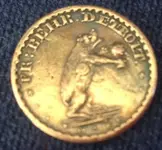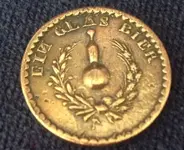Wow! That appears to be a very rare and sought after token. Here is a Heritage Auction link and if you aren't a member and the selling price is blocked out for you I have included that too
 (1861-65) Fr. Behr, Detroit, MI, F-225I-1a, R.8, XF45 NGC. ... Civil | Lot #5987 | Heritage Auctions
(1861-65) Fr. Behr, Detroit, MI, F-225I-1a, R.8, XF45 NGC. ... Civil | Lot #5987 | Heritage Auctions
[TABLE="width: 100%"]
[TR="class: bidbox-divider, bgcolor: #EEEEEE"]
[TD="class: bidboxcol1-row2 x120, align: right"]
Sold for:[/TD]
[TD="class: bidboxcol2-row2"]
$4,312.50 (includes BP
)
Currency Converter
Bid Source: HA.com/Live bidder[/TD]
[/TR]
[TR]
[TD="class: bidboxcol1 x120, align: right"]
Auction Ended On:[/TD]
[TD="class: bidboxcol2"]Apr 20, 2012[/TD]
[/TR]
[TR]
[TD="class: bidboxcol1 x120, align: right"]
Item Activity:[/TD]
[TD="class: bidboxcol2"]7 Internet/mail/phone bidders
261 page views[/TD]
[/TR]
[TR]
[TD="class: bidboxcol1 x120, align: right"]
Location:[/TD]
[TD="class: bidboxcol2"]Renaissance Schaumburg Convention Center Hotel
1551 North Thoreau Drive
Schaumburg, IL 60173
Undated MI-225I-1a Detroit Token, XF45 NGC
Frederick Behr
Second Rarest Detroit Token
(1861-65) Fr. Behr, Detroit, MI, F-225I-1a, R.8, XF45 NGC. Frederick Behr was the son of Christ and Regina Behr, born in Baden, Germany, and residing with his wife, Mary, in Detroit in 1870. He died in Detroit on November 19, 1879. His death certificate recorded his age as 63 years and 2 months, suggesting that he was born in September 1816.
Behr operated a dining saloon and bowling establishment in Detroit. His business appears in different locations at various times. The 1856 edition of the Michigan State Gazetteer and Business Directory places Behr at the corner of Russel and Mullett, and the 1863 edition of the same work gives his address as 75 Griswold. David Perkins, a collector of Detroit tokens, found the following notice in a May 1863 issue of the Detroit Free Press: "F. Behr has sold out his business near the Post Office and will open in a new place, 926 Jefferson Avenue, opposite Miller's garden, May 21." The 1875 edition of the Michigan business directory provides another address, "70 Congress e." An 1877 Detroit city directory gives his address on Congress, noting that he operated a "Wine Hall."
Cliff Temple discussed a minor Civil War era incident involving several Detroit merchants in "The Merchant Unionists of Detroit" that appeared in the Spring 1972 issue of the Journal of the Civil War Token Society. It seems that a group of Southern refugees took up residence in Canada during the Civil War with plans to invade Detroit. With few Union troops available, a number of Detroit merchants created a force known as the "Minutemen" to protect the city. More than 1,000 volunteers successfully protected the city from those Southern forces, mostly Confederate intelligence personnel. Frederick Behr was among the merchants involved in the Unionist movement.
The obverse bears the inscription FR : BEHR DETROIT with a standing or dancing bear holding a beer mug. Crude initials W R below likely identify the manufacturer or die sinker. The reverse die has the inscription EIN GLAS BIER and illustrates a bowling pin and ball, suggesting that bowling lanes were part of the business. Perkins estimates that only about eight examples of the Behr token exist today. It is the second rarest merchant in the Detroit series, and ranks among the most important Michigan tokens. Smooth medium olive surfaces with trivial handling marks on each side. A single small corrosion spot is visible at 7:30 on the reverse.
From The Clifton A. Temple Collection.[/TD]
[/TR]
[/TABLE]









